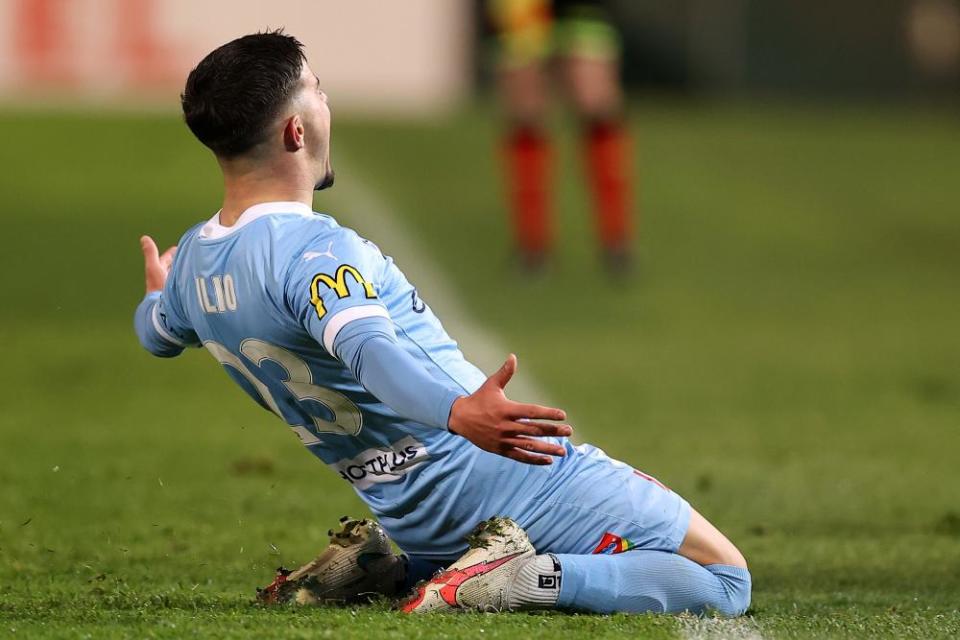Crowds or not, Melbourne City should have right to host A-League grand final
Home-ground advantage is a peculiar thing during a pandemic. The “home” is still in its rightful place, except that some of the furniture has been removed and you’ve stopped receiving visitors. And it does all feel a bit odd given you have grown used to people shouting at you, or each other, or just generally contributing to the buzz of a household. It is, in sporting parlance, the “atmosphere”.
Related: Melbourne City beat Macarthur to book A-League grand final against Sydney FC
During the Covid-19 era, when crowds have either been capped or prohibited altogether, the popular message – which does hold merit – is that home-ground advantage has diminished. But does this mean you are going to pick up and move house? Melbourne City didn’t want to last weekend when, because crowds were prohibited from AAMI Park, Patrick Kisnorbo’s premiers were told to travel to Sydney to play their “home” A-League semi-final about 900km closer to Macarthur FC territory than theirs.
This week’s high-stakes health-and-safety wrangling between the Australian Professional Leagues and the Victorian government will determine whether a variation on this scenario is repeated for the grand final, or if City will be granted the right to exercise a privilege they had already earned.
The APL has done a laudable job adapting to unforeseen circumstances, further evidenced by A-League commissioner Greg O’Rourke’s intent to “push everything we have to put this back in Melbourne and give Melbourne City the right they deserve”. However, there is still this notion that the size of the crowd will be the biggest discerning factor in the outcome.
“We’ll go through the same process we did to try and have Melbourne play their semi-final at home, which was to have a number of options on the table,” O’Rourke said on Sunday. “We had 25%, 50% and above, and we’ll go through exactly the same, talk to the Victorian government and try to get the maximum crowd possible, but it is quite difficult because today it’s still zero inside the CBD.
“As to where it goes after that, we haven’t decided. In fact, a number of governments have spoken to us about maybe taking the grand final away, but that’s really a distant plan B for us.”

In reality, the “distant plan B” is more likely just on the other side of the next intersection, its activation hinging on which state government is willing to let more people through the gates. Perhaps more sobering still is that it will likely come down to which option offers the most revenue. At present, AFL matches scheduled to be played in Melbourne this weekend are still waiting to learn the crowd limits for the MCG and Marvel Stadium, having applied for 50% capacity but expecting the figure to be lower.
Compounding the challenge is the moving feast of Sydney’s Covid cluster and Melbourne’s still-precarious position, which could change significantly at any point over the next few days and require a move to another state.
In football in Australia, at least, the numbers suggest this would not make a huge difference. According to statistics guru Andrew Howe, of the 32 home-and-awat championship-deciding men’s national-league grand finals since 1984, home city teams have won 15 and away city teams have won 11, with six draws that led to penalty shootouts. In most of those matches, the higher-ranked team hosted.
Indeed, City saw off Macarthur on Sunday in a manner convincing enough to feel confident about matching – even beating – Sydney at any venue in the country.
Be all that as it may, other factors can play a part in a team’s quest to gain any possible edge. Less routine-disrupting travel, the ability to sleep in one’s own bed, a familiarity with the idiosyncrasies of a home pitch. Maybe it’s just superstition or an intangible feeling.
It might be that Marco Tilio, the 19-year-old head-turner whose semi-final exploits alongside Stefan Colakovski helped City to this point, feels more settled playing his old club Sydney in his new environment. It may be the opposite for Sky Blues and former City midfielder Luke Brattan.
This could all be utter rubbish. But even if it is, it is City’s call to make, by virtue of their premiership and to maintain the integrity of the competition.
Even Brattan said as much this week. “The government is going to do what’s best for the government, not for an A-League team,” he said. “Hopefully for them it’s in Melbourne. Their fans deserve it as well – they’ve had a great year. It’d be a bit harsh on them if it wasn’t there.”

 Yahoo Sport
Yahoo Sport 





































